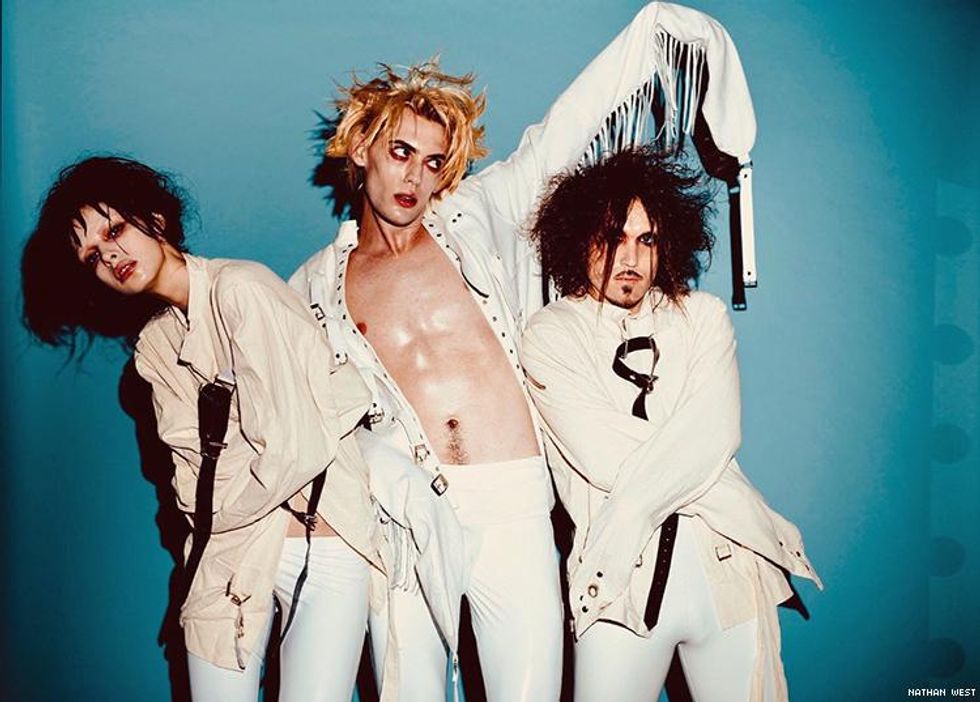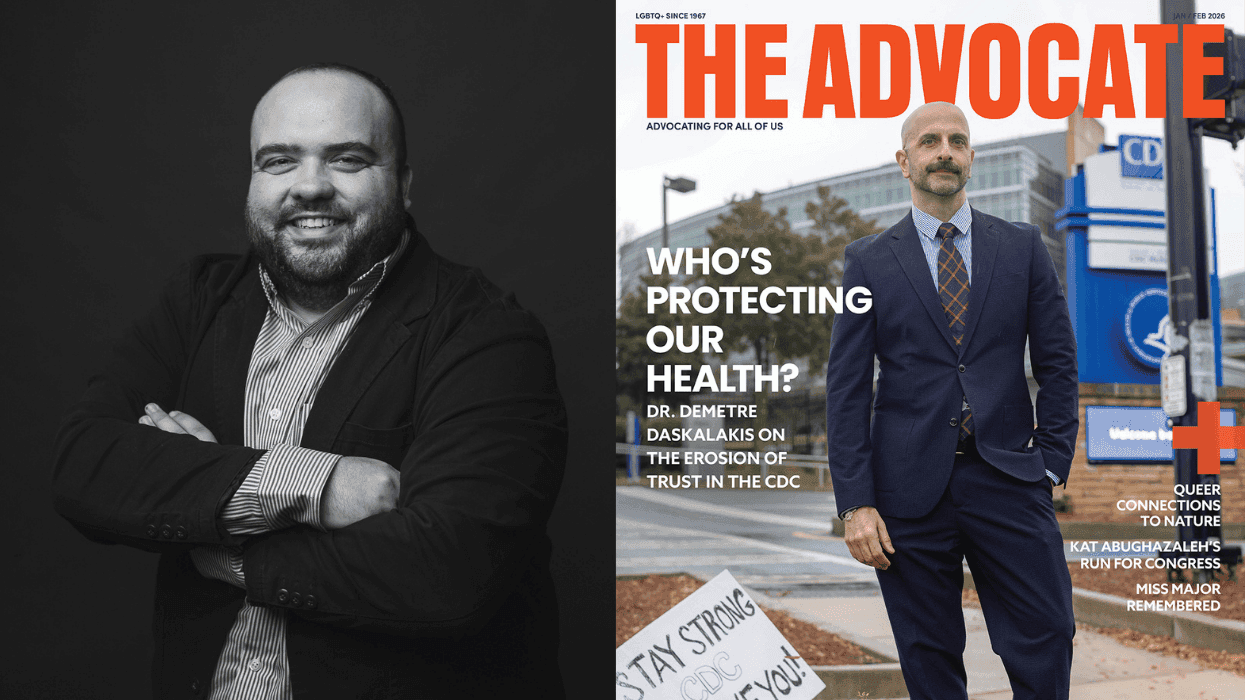The band Uni -- composed of Jack James, David Strange, and Kemp Muhl -- has released a political new music video, "American Fag."
Haven't heard of Uni before? The glam rock group's music is "what they'll have playing in the headphones on the first passenger flight to Mars," says Strange, a former guitarist with Courtney Love.
Strange joined forces with bassist Muhl -- a director, model, and musician who is also known for The Ghost of a Saber Tooth Tiger, a duo she formed with her boyfriend, Sean Lennon -- and gay singer James, after the three were swallowed whole by a crocodile in the Congo River, claims Strange.
"When we woke in our camp the next morning our pockets were filled with crocodile teeth. We set them to work on our drums and guitars. We called the sound it made Uni," Strange says.
The video of "American Fag," directed by Muhl and shared exclusively with The Advocate, is the latest fruit of this fable-like formation. Inspired by the marriage equality movement, the song is a queer anthem that is also a pushback to P.C. culture.
James, Strange, and Muhl discuss "American Fag" below, as well as queer representation in the music industry, reclaiming slurs, and the state of masculinity in America.
The Advocate: What inspired the song "American Fag"?
Kemp Muhl: The day gay marriage became legal ubiquitously we wrote this song, long before the band actually existed. The parade [celebrating marriage equality] was happening on our block in the West Village and I was strumming the chords over the din while David [Strange] grabbed a pad of paper and started jotting down some lyrics with me.
The storyline follows a small-town boy who has a penchant for [gay poet Allen] Ginsberg and dressing up, and eventually moves to the big city to pursue his dreams and true self -- the last verse entreating his small-town parents to understand that the world doesn't need another Wall Street banker or lumberjack and that it's OK their son is different.
Why did you decide to use an antigay slur in the title and lyrics?
Muhl: It's not antigay to us at all. It's clearly a play on words of the American flag. It turns a symbol that represents patriotism and pride in our country (and often homophobia) into a pun for gay rights.
If some frat boy yelled it at us on the sidewalk it would be insulting, yes, but amongst our queer friends, we call each other fag in a teasing, loving, cheeky way -- all the time in a reclaiming/declawing form of the word. Yeah, we're fags, and isn't that great! As for political correctness, it's lost its sense of humor, yawn... we think, at least, Oscar Wilde would agree.
We love how you included BDSM in a music video that's stylized like a vintage New York. What message did you want to convey to viewers with the video's visuals?
Muhl: Ha ha, I love the symbolism of BDSM. Coming from a conservative Catholic background, it's almost a compulsory middle finger to prudishness and a meta-statement on government mind control/obedience. The vintage vibe comes from the Super 8 film we shot the video on; I wanted it to look straight-up 1970s, The Cockettes meets Diane Arbus meets the Factory and John Waters.
Actually, our friends get so freaked out because we always have ball gags and gimp suits and dildos laying all over my house after shooting music videos! Wish there was a Salvation Army we could donate this kind of stuff to. [winks]

What commentary did you want to make with the song and music video on masculinity in America?
Muhl: There's room for many definitions of masculinity in the modern era. The traditional warrior, the nouveau poet, the contrarians, and the conformists. In our one band alone there are macho heteros, platform-heel-wearing homosexuals, irreverent Jews, atheists, social justice warriors, Libertarians, and the whole thing is led by a bossy bisexual tomboy. We span the spectrum of politics and sexualities more than any band I know, and it's awesome to get together and tease each other or debate/challenge each other's comfort zones rather than stick to a single clique of closed-minded clones fomenting hatred for their opposition.
I wish there was more of this dialectic in America now and "odd couple" friends cross-pollinating. We shot this video in front of the Coney Island freak show because we want to usher in the 21st-century freak show where everyone is welcome and weird as they wanna be. We're so bored of plastic, prime-time predictability. Give me PVC, not P.C.
What are the hurdles facing queer voices in the music industry?
James: I think the problem almost lies in the question. We live in a time where there is more queer representation in the mainstream media than ever before. There is power in that, but it's a double-edged sword.
I've been "too gay" and "not gay enough" oftentimes all at once as if gayness was some quantifiable standard; it's absurd. This power is so much more important than fitting a box labeled "queer" or "gay," decorated with ornamental tropes of "fabulous," "fierce," etc., as if to say "You can be queer but only on our terms."
Identifying as queer is lived entirely on one's own terms. It's a part of who I am, but I neither begin nor end there. I'm open, I'm out, I'm visible, and I will carry the flag to my grave, but what's more important and inspiring to me is being the advocate I needed as a kid, and that means being uncompromisingly authentic to the groove of my own soul.
The hurdle is to take all of this and disseminate without assimilating, persevering unapologetically. We're here, we're queer, but we've got something else to say too. That's truly what this song is about. Being marginalized and choosing to party in the margins. That's my pledge of allegiance to myself in the face of turbulent times. That's the star I want to be.
There were many queer women nominated at this year's Grammys -- not so many queer men. Why do you think that was the case?
James: That's a great question and something I observed as well. I was so happy and proud of the queer women who were nominated and those who won. Visibility is so important for our community, and aside from that, those women are damn good musicians that deserve props, especially in an industry that has a long history of not recognizing women, let alone queer women (even more so those of color).
But to answer your question, and as trite as this might sound, what I believe that really comes down to is the age-old saying: Women can wear pants but men can't wear dresses. Every governing body and institution should be held accountable for its actions, even the complacent ones, but in truth, I've never looked to the Recording Academy as the omnipotent validator of "good" or equitable culture but rather a reflection of what's just the most easily digestible.
As for me and my art, I want to shatter that. As progressive as humans have become, we live in a puritanical society. I want to move our collective consciousness into a utopia and a realization that we all possess sun and moon, masculine and feminine qualities; we are all of the same creation. These labels separate us. It's OK and even celebrated for a woman to possess more "masculine qualities," but when a man possesses more "feminine" it's deemed vain or even silly.
What's next for Uni?
James: More music, more videos, more shows, more love, less hate, and I guess world domination. Join our cult and I'll love you forever.















